
As SEOs, we’re in love with Google. We track every algorithm change.
We speculate about new features and opportunities. We obsessively monitor Page 1 rankings.
And it makes sense.
After all, Google remains the #1 search engine by traffic.
But this obsessive single focus may be too much.
So, it's time to break your unhealthy relationship with Google and start paying attention to DuckDuckGo.
5 Facts About DuckDuckGo
While smaller than Google and Bing, DuckDuckGo has come a long way in its 10 years of operation and is growing fast.
That means there are some interesting SEO opportunities there.
Here are a few key facts about the search engine:
1. It was founded in 2008.
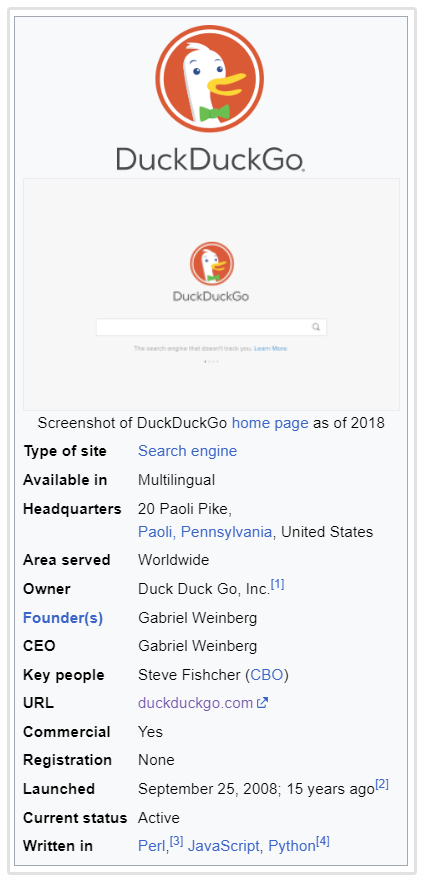
That makes DuckDuckGo about 10 years younger than Google, which was founded in 1998.
2. It emphasizes privacy protection.
In an era of hacking scandals and increasing regulation, DuckDuckGo stands out from other search engines. It doesn't track your searches or keep a record of them, and doesn't collect or share your personal information.
As the company points out in their privacy policy, "It's sort of creepy that people at search engines can see all this info about you, but that is not the main concern. The main concern is when they either a) release it to the public or b) give it to law enforcement."
Essentially, every search on DuckDuckGo is completely anonymous and private.
3. It has two main sources of revenue.
DuckDuckGo makes money by serving ads from the Yahoo-Bing search alliance network, and by earning affiliate commissions from eBay and Amazon.
4. It still has a small market share.
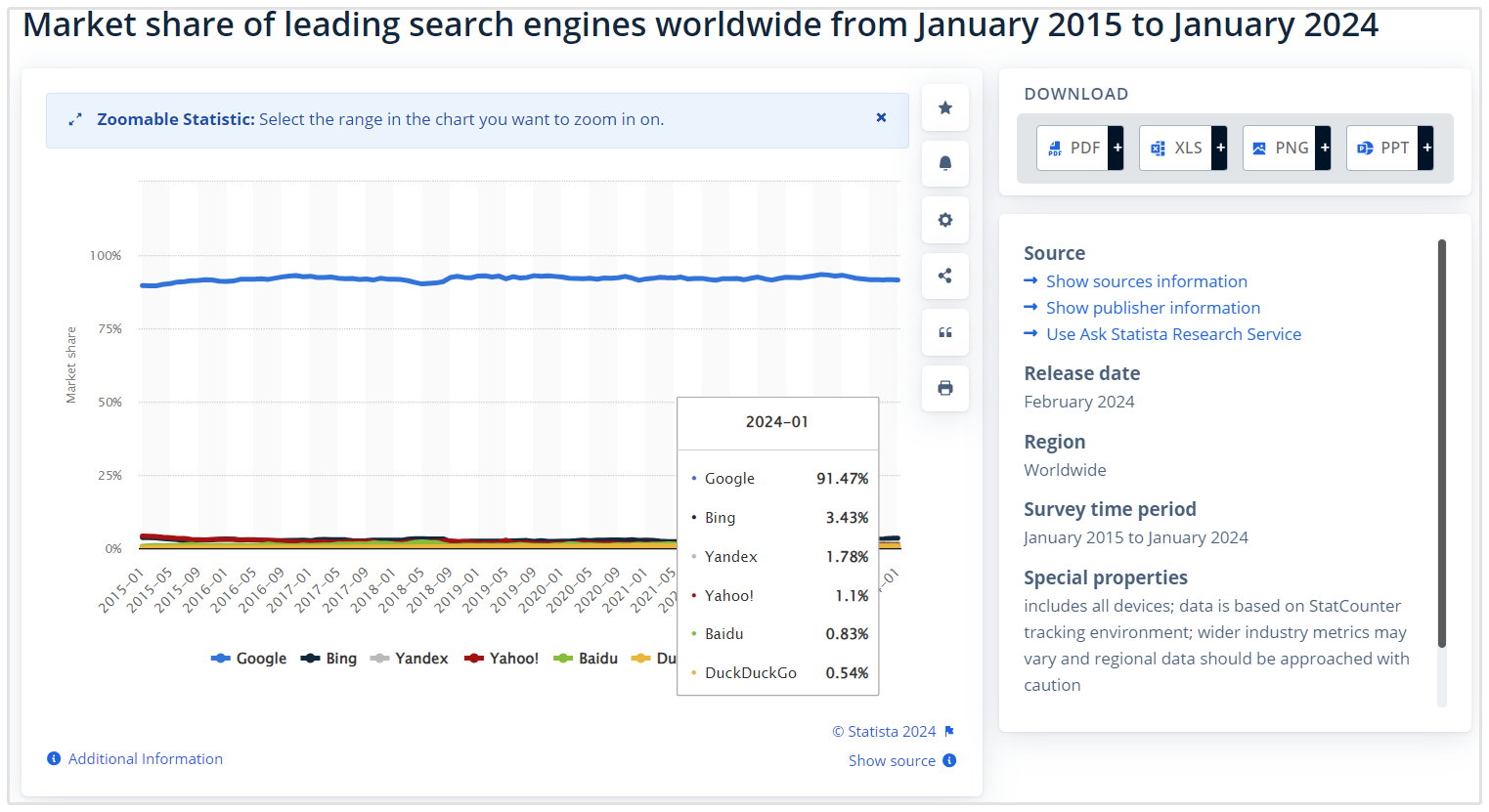
It's true that DuckDuckGo currently gets less than 1% of global search engine traffic.
Keep in mind though that even less than 1% is still a substantial share of the market, especially when you factor in the company’s growth rate.
5. It's growing fast.
In 2018, DuckDuckGo had already processed over 7.2 billion searches. That figure represents a massive increase on its 2010 search volume of 16 million searches.
At this rate of growth, DuckDuckGo may very well become the #2 search engine one day in the future.
DuckDuckGo SEO
Now you’re probably asking, if DuckDuckGo is different to Google, what exactly do you need to do differently to win at DuckDuckGo SEO? Do you need to reinvent your entire strategy?
The good news is no, you don't.
If you're already following SEO best practices like creating outstanding content and ensuring your site is technically sound, then you're already on the right track.
That said, there are some SEO opportunities specific to the platform that you need to know about.
Follow these four steps to optimize your site for DuckDuckGo and start ranking!
1) Refresh Your Local Keyword Strategy
As a privacy-oriented platform, DuckDuckGo doesn't use geo-location data in generating search results. While this decision helps to keep users anonymous, it has several implications from an SEO perspective.
Primarily, it means that the local search results aren't very accurate.
So if you're a local business, you'll need to put in a bit more work to appear in DuckDuckGo's local search results.
(Note: Local SEO is best suited for companies that have a retail location, office location or focus on serving a specific city or town. If you operate online only, this section won't be as important for you.)
What you need to do here is get a list of your most important or profitable keywords—these are the ones to focus on ranking in DuckDuckGo.
If you have an SEOptimer account, you can pull up your keyword list to easily identify which ones you're already doing well for and which ones need more attention.
![]()
Then, add relevant geographical variations to your keywords to help them rank in local search results.
Because you can't rely on DuckDuckGo to accurately pinpoint searchers' locations, using location-specific keywords will help your pages be found by local DuckDuckGo searchers.
For example, if you're marketing a business located in Toronto, Canada, there are several geo-specific keywords to consider adding to your main keywords:
- City: Toronto (e.g. "best pizza toronto")
- City Area: North York (e.g. "pizza restaurant north york")
- Area Code: 416 indicates the City of Toronto rather than an adjacent suburb (e.g. "best pizza 416")
- City Slang and Abbreviations: “TO” is used by locals (e.g. “best TO pizza”)
In the screenshots below, you can see the difference in the search results when you add and remove geographical keywords to the search phrase "best pizza."
In the first search, without any geographical keywords, you can see that the organic results aren't specific at all to my location in Toronto:
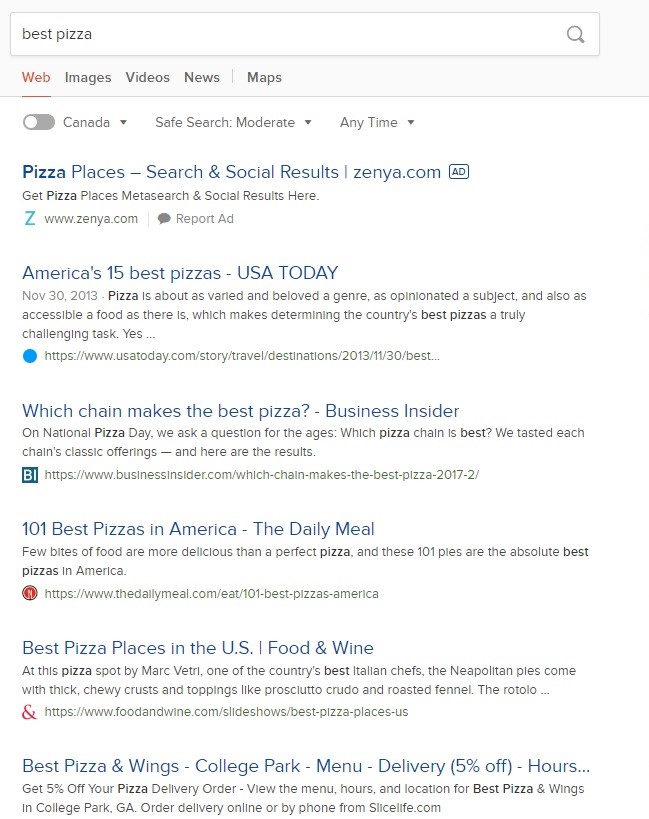
But if you add a geo-specific keyword to the main keyword, the SERP results are much more relevant to my location:
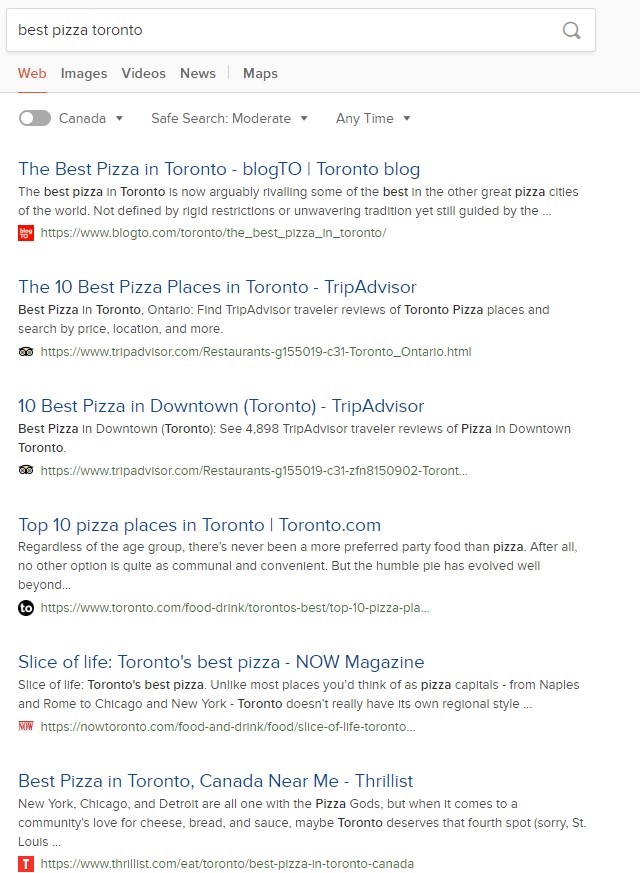
2) Build High-Quality Backlinks
Yes, backlinks matter in DuckDuckGo SEO too.
While the company doesn't reveal much about their rankings process, they do state that "the best way to get good rankings (in pretty much all search engines) is to get links from high quality sites."
But how do you know if you're getting high-quality backlinks? It takes a combination of hard data and your best SEO judgment.
For the data, I recommend using SEOptimer to track your backlink profile and provide you with an up-to-date list of all your backlinks, plus essential quality metrics about each one.
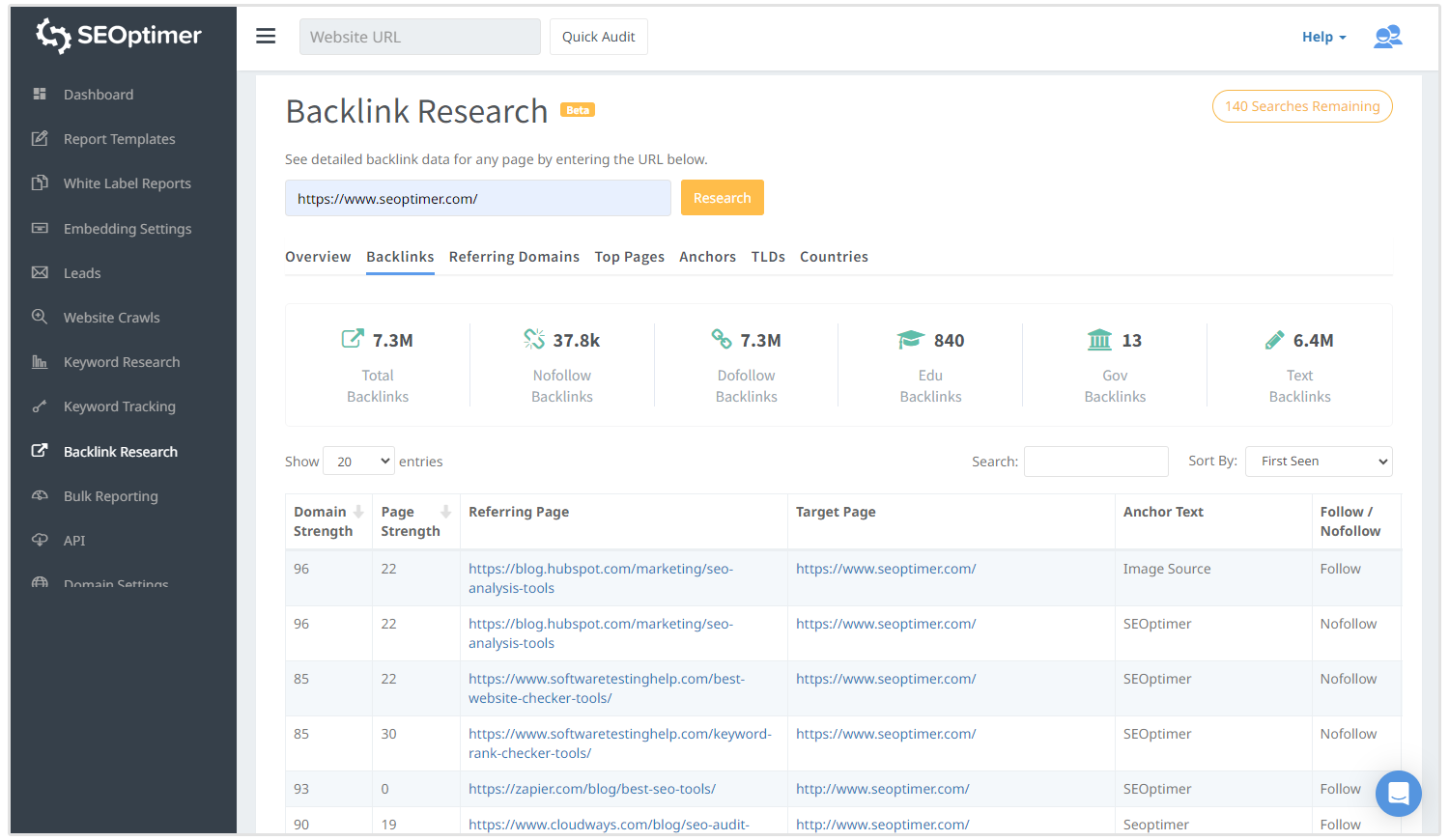
To assess whether these are high-quality backlinks, you need to consider the following data points:
- Domain Strength. On a scale of 0-100, Domain Strength is a good indicator of quality. Publications like the Wall Street Journal have a Domain Strength of 90+.
While backlinks of that caliber are rare, any referring domains with a Domain Strength of 50 and above are excellent additions to have in your link profile.
- Type. Is it a do-follow or a no-follow link?
Do-follow links are more powerful, but many authoritative publications like Entrepreneur only use no-follow links. These types of links are still valuable in terms of traffic and brand building.
But data and numbers don't tell the whole story.
Make sure to use your judgment and consider these qualitative factors as well:
- Relevance. Is there alignment between the website providing the backlink and your website?
For example, a backlink from SEOptimer to Neil Patel’s blog is relevant since both are in the marketing industry. In contrast, a backlink from a bank or home renovation company to SEOptimer? That would not be relevant.
- Placement. The best backlinks are “editorial,” meaning they're embedded naturally in a piece of content. Even better if the link is being discussed in some way.
In contrast, a backlink buried in the footer or some other out-of-the-way place suggests a lower level of quality.
- Framing. If a backlink is framed with positive language, the user is relatively more likely to convert when they land on your website.
Where to Get Endless Backlink Ideas
Now that you know how to make sure your links are from high-quality sites, how do you get more of them?
Once you've picked all the low hanging fruit like Google backlinks, the simplest way to find sources of new backlinks is to track your competitors' backlinks. See who's linking to your competitors, and then go get those links for yourself!
SEOptimer automatically tracks the link building activities of your competitors and shows you all the links they've received, in a list similar to your own:
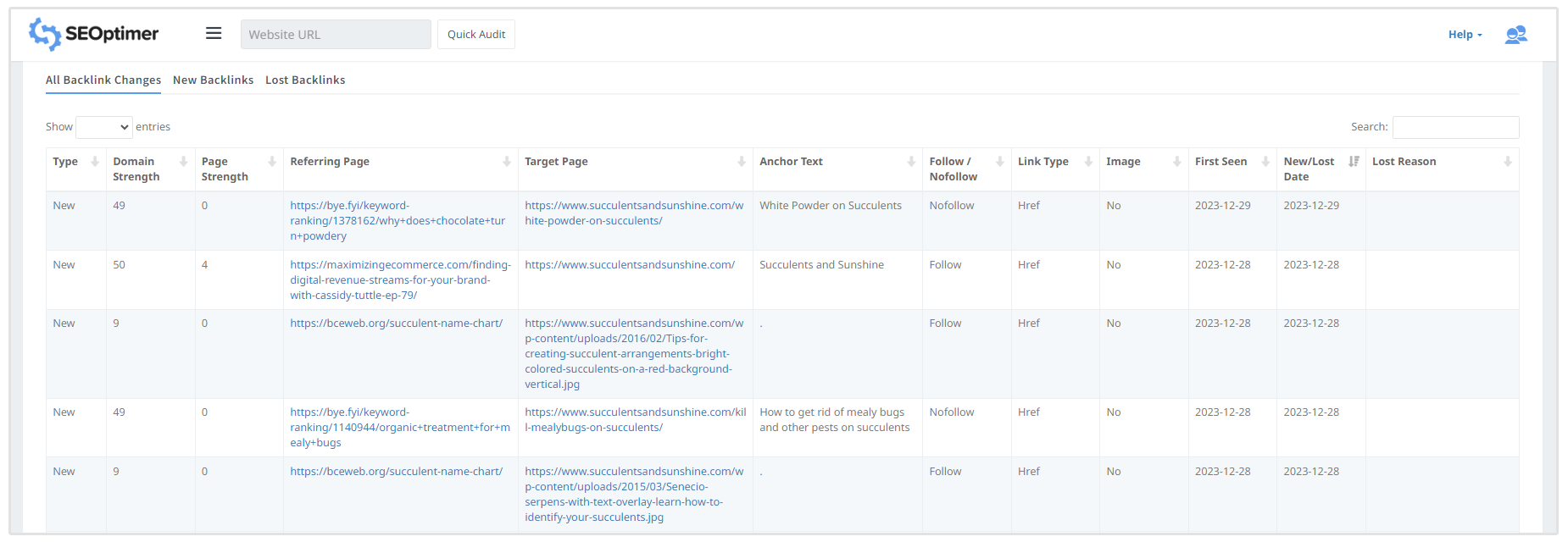
You can track the backlinks of major industry players and popular websites to get plenty of new backlink ideas.
3) Optimize for DuckDuckGo's "Instant Answers"
Providing the definitive answer to a search query is the definition of success in search.
In addition to landing on Page 1 of the DuckDuckGo SERPs, you can also leverage their “Instant Answers” feature. Here's what that looks like in practice:
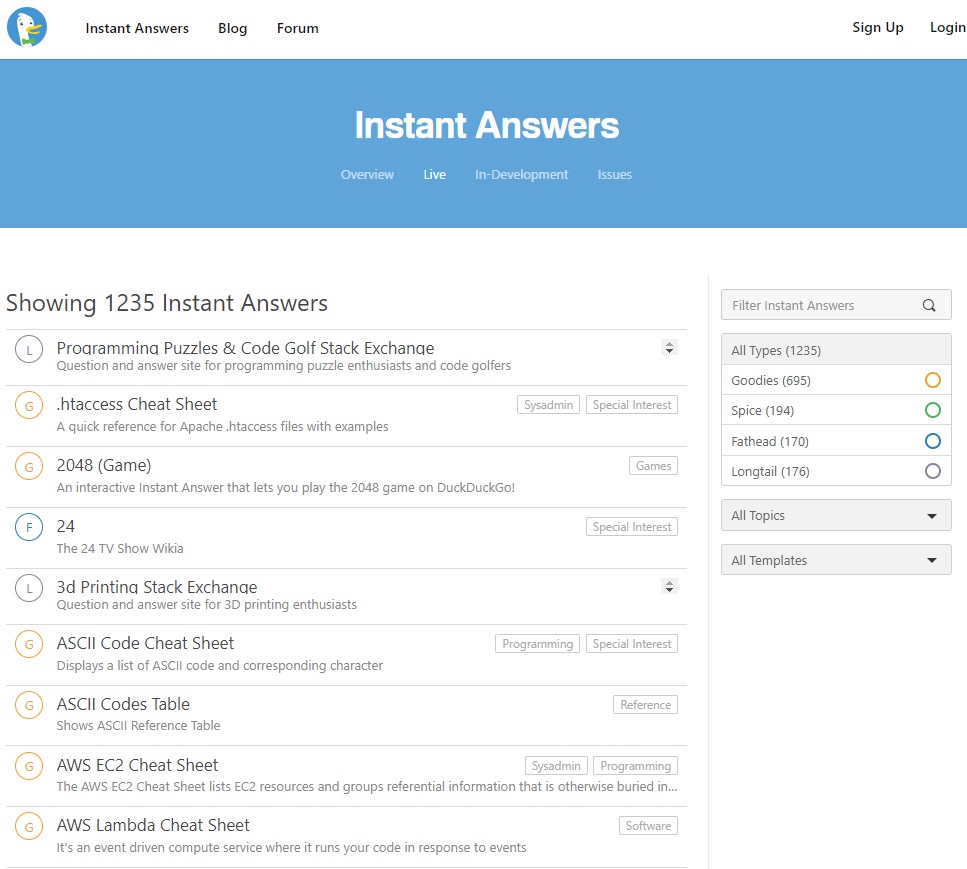
How do you get your brand and website featured in an Instant Answer?
DuckDuckGo pulls answers from Wikipedia, Crunchbase, GitHub, wikiHow and the Free Dictionary. That means creating content on those platforms will help you attract more placements.
You can find out more about the Instant Answer API here (unfortunately, you can't directly contribute to this feature from a development perspective any longer).
4) Set a Realistic Resource Allocation
To win at SEO, you need to keep investing time and resources into it.
While DuckDuckGo is growing fast, it's still far behind Google and Bing/Yahoo. So as a general rule, you shouldn't be spending more than 5-10% of your total SEO efforts on DuckDuckGo.
There are, of course, some cases where it might make sense for you to invest more heavily in the search engine, such as if privacy is intrinsic to your company values or to your product itself (e.g. a privacy protection product).
For most companies, DuckDuckGo is an important platform to explore for SEO, but should still be a secondary priority to Google.
With that said, there are many tasks that will boost your results in any search engine, so it's always a good idea to focus on things like creating great content and building great links first.
DuckDuckGo SEO Wrap-Up
Google is a mature search platform and rightly deserves the majority of your focus.
However, if you really want to distinguish yourself from the crowd, pay some attention to DuckDuckGo too.
It may be small compared to Google, but it's growing fast, caters to an important niche of privacy-oriented searchers, and is simple to optimize for!
Bruce Harpham helps enterprise software companies grow faster with content marketing. Read his article “The 13 Must-Read Books Recommended By Founders of High Growth SaaS Companies.”










